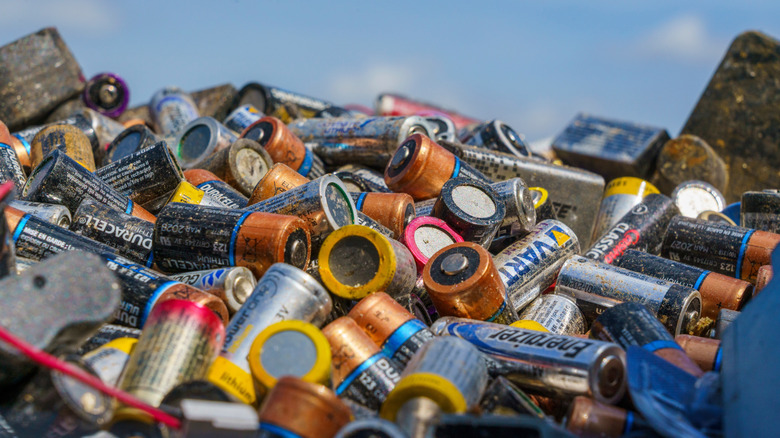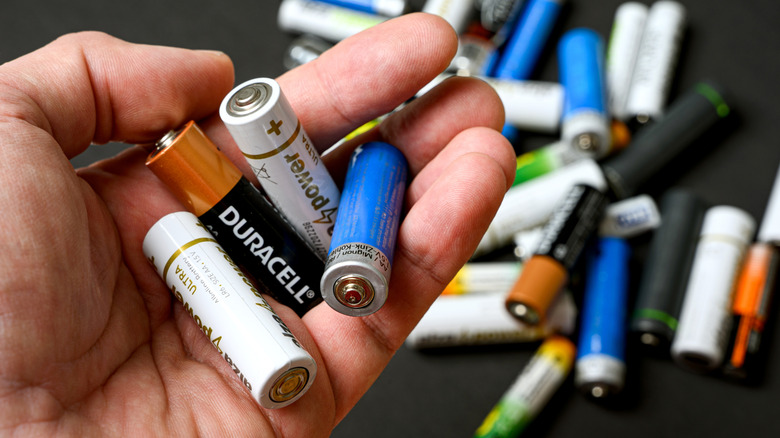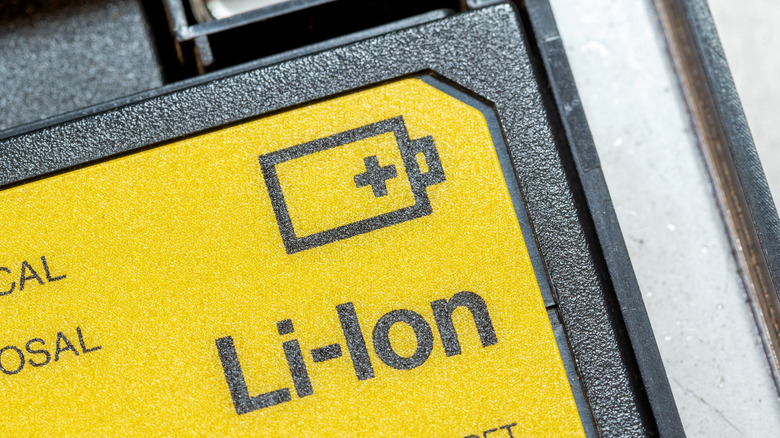How To Declutter Used Batteries (The Right Way)
There's a good chance that right now, you have a growing pile of used batteries in a kitchen drawer or storage bin waiting for the day you figure out how to properly dispose of them. It's an easy item to let accumulate, but improperly tossed batteries can be a danger to the environment, especially the rechargeable varieties containing heavy metals. The first step of decluttering these batteries is understanding what you have. Single-use batteries (most commonly alkaline) are the workhorses found in everyday household items like remote controls, smoke detectors, clocks, and flashlights.
In contrast, rechargeable batteries are most often found in devices we use constantly and plug in to refresh, such as laptops, cell phones, power tools, digital cameras, and cordless vacuums. Both have a different chemical makeup and must be handled differently when they finally die. This distinction is important because while some local laws allow certain single-use batteries to just be tossed in the trash, pretty much all rechargeables are classified as hazardous waste and must be recycled, though there are many common items you shouldn't be putting in your recycling bin.
Before you take any action, though, we must note that state and local regulations for battery disposal can vary greatly, especially when it comes to alkaline batteries. Many cities have updated their waste management offerings to include battery recycling programs, though others may still have restrictions. We recommend checking with your local public works or solid waste authority's website for the most accurate, up-to-date rules for your community. Knowing this info is the key to decluttering your battery stash the right way.
Safely dispose of single-use alkaline batteries
Once an alkaline battery dies, properly getting rid of it depends on its age and location. The good news is that alkaline batteries manufactured today no longer contain the mercury older versions did. This change means that many municipalities, as well as the Environmental Protection Agency, permit residents to simply toss used alkaline batteries in their regular household trash. However, this is often discouraged; while it's technically legal in some places, it's always better for the environment to recycle them.
Now before you dispose of your single-use batteries, you need to take an extra step for safety: tape the ends. Even when drained, batteries can retain a small residual charge that can potentially cause a short circuit or fire if the positive and negative terminals of multiple batteries touch. So, use clear packing tape or electrical tape to cover every terminal before dropping them off; it's a good trick to avoid starting a fire with old batteries.
If your local authority does not offer a specific recycling program for alkaline batteries, look for a community-based or retail drop-off location. Many large home improvement stores or big-box retailers have collection bins that accept common household batteries. Alternatively, you can search for mail-in programs or local drop-off sites near you. Taking this extra effort prevents valuable materials from ending up in a landfill.
Always recycle rechargeable batteries
Unlike alkaline batteries, the rules for rechargeable batteries are near-universal across the United States: They must be recycled in the majority of cases. Rechargeable batteries typically have lithium-ion, nickel-metal hydride, or nickel-cadmium composition; in fact, there are many dangers you should know about lithium-ion batteries. They have large amounts of valuable, reusable materials and, more importantly, heavy metals that are toxic and pose a serious environmental risk if incinerated or landfilled. Disposing of this type of battery in the regular trash or even your curbside recycling bin is illegal in most places and incredibly dangerous as lithium-ion batteries are a big cause of facility fires.
The preparation process for rechargeable batteries is the same as for single-use ones, where you must individually tape up the terminals. Furthermore, if you see a rechargeable battery that is swollen, leaking, or damaged, you should immediately place it in a nonflammable container (like a sand-filled bucket) and contact your local waste authority for the specifics on how to handle the hazardous material. Never drop off a damaged battery without professional guidance.
Fortunately, recycling your rechargeable batteries is easy thanks to industry-funded programs. Look for local drop-off points via the national, nonprofit Call2Recycle program. It partners with a slew of municipalities and retailers (like The Home Depot) to make it easy for you to find a free collection site. Properly managing your old batteries is a small task with a huge impact, keeping your home safe along with the environment.


